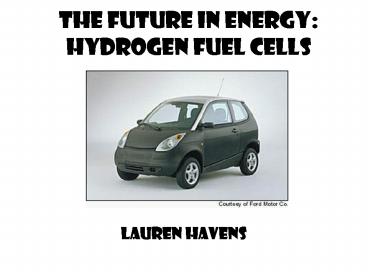The Future in Energy: hydrogen Fuel Cells - PowerPoint PPT Presentation
1 / 7
Title:
The Future in Energy: hydrogen Fuel Cells
Description:
They are electrochemical devices that use a natural gas, such as hydrogen ... NK prototype, modeled after the Focus sedan, is powered by the latest generation ... – PowerPoint PPT presentation
Number of Views:2383
Avg rating:3.0/5.0
Title: The Future in Energy: hydrogen Fuel Cells
1
The Future in Energy hydrogen Fuel Cells
- Lauren Havens
2
What is a Fuel Cell?
A fuel cell is like a battery that recharges
itself. They are electrochemical devices that
use a natural gas, such as hydrogen to create
energy. Fuel cells do not use the traditional
method of combustion to extract energy, but
rather chemically combine hydrogen from oxygen.
That means that fuel cell energy completely
skips, the conversion of heat energy to
mechanical energy to electricity, making it much
more efficient.
3
What is the history of fuel cells?
- Though they seem like a mystical new technology,
fuel cells have actually been studied for more
than 150 years! - The first fuel cell was developed by William
Robert Grove in the early 1800s. He found that
he could combine hydrogen and oxygen to create
electricity and waterhe called it a "gas
battery. - The fuel cell remained mearly a curiosity
throughout the 1800s. - Fuel cells have been studied intensively,
especially since World War II.
4
What are the advantages of fuel cells?
- They are clean the only emission is water vapor.
- They are more efficient than energy sources that
include combustion. - Hydrogen is the most plentiful substance on the
Earths surface.
5
What are the Problems with Fuel Cells?
- As a gas, hydrogen is not concentrated enough to
be used in a fuel tank. (One solution is to
compress it to high pressures. Another is to
chill it to very low temperatures, causing it to
liquefy.) - Hydrogen is a non-renewable resource.
6
What are some examples of use of fuel cells?
- Long Island is currently installing fuel cells
that will be able to power average-sized homes. - 46 Fuel-cell powered buses will be provided to
Mexico City, Sao Paulo, Cairo, New Delhi,
Shanghai, and Beijing in a 60 million program by
the Global Environment Facility for Mexico City. - Ford's FC5 TH!NK prototype, modeled after the
Focus sedan, is powered by the latest generation
of fuel-cell technology.
- A family in Connecticut is installing a fuel cell
system to power their dairy farm. - Electrical power for NASA's Space Shuttle Orbiter
is provided by fuel cell power.
7
Bibliography
- Collecting the History of Fuel Cells,
americanhistory.si.edu/csr/fuelcells/ - Environmental Science, Karen Arms
- Environmental News Network, enn.com
- Howstuffworks.com
- H-Power Pacific, hpowerpacific.com
- National Fuel Cell Research Center,
nfcrc.uci.edu/index.html - UTC Fuel Cells www. Ifc.com































